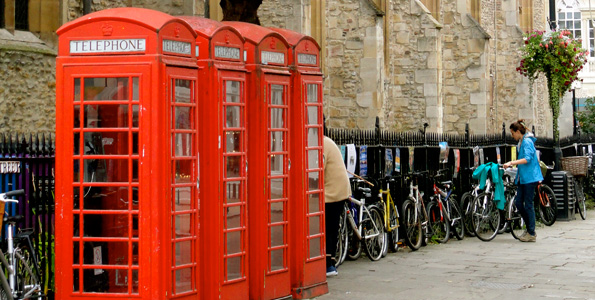Telephones
Useful Terms
GSM: Global System for Mobile communications is a common world standard for mobile phones. It makes international roaming common between mobile phone operators, enabling subscribers of one service to use their phones on many other services around the world. Some companies refer to this as a “world phone,” because the device can work on networks essentially around the world.
Quad-band phone: A GSM phone that can operate in four different frequency bands:
- 850 MHz (US/Canada/Latin America/Brazil)
- 900 MHz (Africa/Europe/Brazil/Australia/much of Asia, except Japan and South Korea)
- 1800 MHz (Africa/Europe/Brazil/Australia/Asia)
- 1900 MHz (US/Canada/Latin America/Brazil)
SIM card (Subscriber Identity Module): A portable memory chip used in some models of cell phones. You can switch to a new phone by simply sliding the card out of the old phone and into the new one. When you purchase a pre-paid SIM card, be prepared to:
- present ID photos, copies of your passport and visa, and possibly proof-of-residence
- be assigned a phone number randomly by the service provider
- pay in regular increments (e.g., $5 or $10), with the amount of voice and data transmission increasing with the cost of the card
- lose minutes not used by the expiration date (e.g., 90 days)
Unlocked phone: A phone “lock” is a software setting that keeps the device “loyal” to one carrier. A locked phone will recognize a SIM card only from a particular carrier, while an unlocked phone will recognize a SIM card from any carrier. You can purchase unlocked devices at various online retailers, such as:
Consider Before Buying
- You’ll probably pay full retail price for an unlocked device.
- In many countries, you have the option of purchasing an unlocked device and then choosing your service provider.
- If you plan to be abroad for more than a few weeks, consider purchasing a disposable phone at your destination, specifically for local calls (in addition to using an international phone for US calls).
Jailbreaking—Removal of the restrictions on a smart phone (e.g., an iPhone) that prevent you from loading applications not provided through the standard application store. While it is legal to jailbreak your phone to install third-party apps not offered by the Apple App Store or Android Marketplace, doing so exposes several significant security risks:
- It voids the warranty.
- It is more vulnerable to attack from the outside.
- It needs to be repeated each time Apple issues an iOS update.
Data plans: In many countries, these cost significantly more than in the US. If you don’t have the option or know how to turn off data access while you are traveling, consider canceling your data plan before you leave and reactivating it upon your return. Consult the device instructions or ask your service provider for the recommended solution.
Bringing Your Own Mobile Phone
If you decide to use your personal mobile phone instead of buying a disposable one, keep in mind that modern US mobile phones will work in most urban areas, but coverage in other areas may be limited or nonexistent. You should confirm:
- You have an international plan with your wireless service provider (e.g., AT&T, Verizon) for whatever data-enabled devices you will be using overseas.
- What usage rates will apply in the countries you are visiting.
- If you will be using international service regularly, as an “international roaming” option would lower your total cost.
- Some providers offer reduced usage charges for a set monthly fee.
Carefully review the charges that will apply in the roaming plan that you choose and adjust your usage patterns accordingly. Services that are included for free, or at low cost, in domestic plans (e.g., texting, download music) may incur significant charges in other countries. As an alternative, wireless devices may be rented for international use. Contact phone@bu.edu to learn about the process and available options.
Mobile Phone Security
Mobile phone security is very important in protecting your identity and personal information. Almost all mobile phones have the ability to send/receive text messages and connect to the internet. These features are useful and convenient, but may also expose you to data or identity theft. If you don’t set up your phone securely, others may be able to:
- gain access to account information and personal data
- steal your phone and wireless service
- infect your cell phone with a virus
- lure you to a malicious website
- use your mobile device to attack others
Not only do these activities have implications for your personal information, but they could also have serious consequences if you store University information on your device.
Safety Suggestions
- Lock your cell phone or mobile device with the screen-lock feature.
- Makes it less valuable to an attacker or someone trying to gain access to your information.
- Install a security program:
- Like Lookout Mobile Security, which provides free anti-virus and other security management features for Android, Blackberry, and Windows Mobile.
Internet Phone and Video
Skype (Mac and PC) and iChat (Mac) are popular applications that allow you to reach people over the Internet using instant messaging, file transfer, and video conferencing. Some of these products are desktop applications that require a software download and installation while others require just a web browser. Contact your school or department’s desktop support personnel to determine which of these products will meet your needs abroad and how to install and use them.
Please note that some countries have limited internet access and speeds, which can affect the performance of these software applications, or they may prohibit their use altogether.





